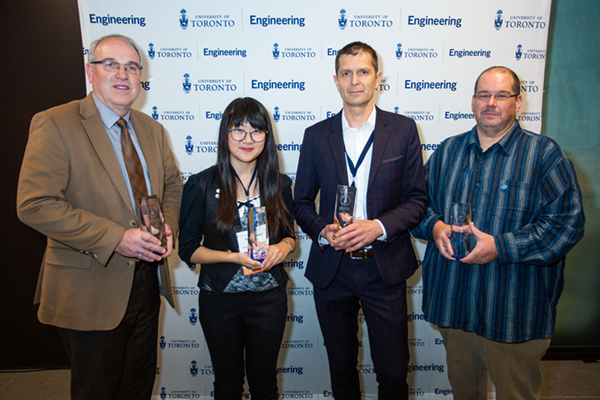
More than 150 industry and community leaders, government partners and faculty members gathered Nov. 13, 2019 at the Myhal Centre for Engineering Innovation & Entrepreneurship for the U of T Engineering Partners’ Reception.
Now in its fourth year, the event celebrated the Faculty’s longstanding ties with over 400 industry partners across its six multidisciplinary innovation clusters. In the past year alone, the Faculty launched new strategic partnerships with Canadian and international partners, totalling more than $25 million.
The reception featured a keynote address by Gillian Hadfield, director of the University of Toronto’s new Schwartz Reisman Institute for Technology and Society. The evening also marked the official launch of the U of T Engineering Expertise Finder — an online platform that enables current and prospective partners to search and connect with Faculty researchers whose expertise matches the industry challenge they hope to solve.
“Through continuous knowledge sharing with our research partners, we are able to bring innovative ideas to market, enhance existing systems and technologies, and generate experiential learning opportunities for our students,” says Ramin Farnood (ChemE), Vice-Dean, Research.
“Many of our undergraduate and graduate students are hired by our research partners, which is a testament to the strength and immense value of these partnerships.”
Four partners were recognized at the reception for research contributions in aerospace, industrial, electrical, materials and civil engineering:
Corporate Research Partner Award — LG
When looking to enhance its products and business using artificial intelligence, LG took note of the innovative AI research taking place at U of T Engineering.
“Two years ago, our former chief technology officer decided that the best way to improve our customers’ lives was to invest in the Toronto ecosystem, build an artificial intelligence (AI) lab and collaborate on research projects with U of T,” says Darin Graham, director, R&D Strategy and Operations, LG Toronto AI Lab.
In those two years, LG has established nine projects with researchers in U of T Engineering and the Department of Computer Science, including launching two novel training programs. The first is the ‘reverse internship,’ which brings LG staff scientists into academic research labs for four-month terms. LG researchers return to their corporate labs better equipped to tackle more challenging problems or entirely new areas of research.
The second training program is the ‘mini-master’s degree.’ Through this program, researchers from LG’s labs in Korea work alongside U of T Engineering professors to refine their skills by completing a capstone project.
“LG is tremendously influential at articulating interesting research problems, funding new initiatives and providing meaningful collaborative inputs across aerospace, industrial and electrical engineering,” says Illan Kramer, director of industrial research partnerships at U of T.
To date, LG has committed $6 million over five years with a three-year research commitment for each of its existing nine projects.
“Our AI lab is located right across from U of T on College Street, which is our commitment to make sure we have close ties,” says Graham.
Corporate Academic Citizen Award — Hitachi High-Technologies Canada (HHTC)
Nearly 30 years ago, Professor Doug Perovic (MSE) and the then CEO of HHTC, established a research partnership around the study of electron microscopy (EM), which enabled the creation of the Ontario Centre for the Characterisation of Advanced Materials (OCCAM). In 2019, the partnership is still going strong.
“HHTC has made profound contributions to leading-edge research and training at the University of Toronto,” says Peter Brodersen, senior research associate, OCCAM. “These contributions have been vital to propelling research across the Faculty and supporting institutional research and training goals.”
Over the years, HHTC has worked closely with researchers from across the Faculty including professors Yu Sun (MIE), Elizabeth Edwards (ChemE) and Jane Howe (MSE, ChemE).
Before joining U of T Engineering as a faculty member, Howe spent several years working at HHTC. “In my experience as both an employee and research partner, it is clear HHTC is a company that values its rich collaborative history with the University,” says Howe. “This is evident in the success and breadth of its research projects.”
Small-to-Medium Enterprise Award — City of Barrie (Surface Water Supply Division)
After installing its state-of-the-art treatment facility in 2012, the City of Barrie partnered with U of T Engineering professors Robert Andrews (CivMin) and Ron Hoffman (CivMin), both NSERC Industrial Chairs in Drinking Water Research, to focus on evaluating and optimizing the water treatment processes for the plant.
Over the past seven years, the team has developed novel approaches to treating drinking water, which have realized significant performance improvements.
Jamey Adams, supervisor of surface water supply for the City of Barrie, attributes the success of the collaboration to the researchers’ “focus and commitment to the industry.”
To date, the partnership has achieved a cost savings of more than $500,000 for the City, as well as providing some of the cleanest drinking water in Ontario to its residents.
Small-to-Medium Enterprise Award — Drone Delivery Canada (DDC)
DDC aims to be at the forefront of how businesses and government agencies use unmanned aerial vehicles (UAV), also known as drones, to provide services and products to its clients.
To stay ahead of the competition, DDC reached out to Professor Hugh Liu (UTIAS) for advice. From there, DDC established two research partnerships in 2017 with Liu as well as professors Tim Barfoot (UTIAS), and Angela Schoellig (UTIAS), to explore new drone technologies.
Liu is working alongside DDC to develop a system that will enable standard-sized modular drones to fly in unison to deliver packages of different shapes and weight.
Additionally, Barfoot and Schoellig are collaborating with DDC to develop ‘learn and remember’ techniques for UAVs — these would enable a drone to fly back safely to its launch site even after losing GPS signal.
“The executive team is very open and supportive,” says Liu. “Several graduate students in our collaboration projects with DDC are now employed by the company to continue working with us. It is rewarding to see that our research and talents recognized and valued.”